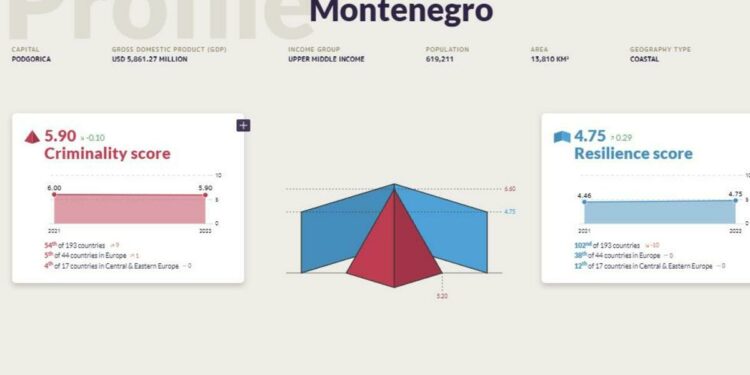The Global Initiative to Combat Transnational Organized Crime (GI-TOC) presented at its site Index of transnational organized crime in the world.
The report stated that the trend of the growth of organized crime at the global level continued, and that 83 percent of the world’s population lives in conditions of a high crime rate.
In contrast, the number of people living in conditions with low resistance to organized crime has fallen significantly – to 62 percent of the world’s population compared to 79,4 percent in 2021.
The GI-TOC report points out that Montenegro still a transit country for human trafficking.
“Human traffickers are predominantly members of organized criminal groups operating in the Western Balkans. Women and girls from Montenegro and neighboring Balkan countries are the most vulnerable to human trafficking. Victims of human trafficking are exploited in the hospitality industry, including bars, restaurants, nightclubs and cafes, and are sometimes forced to commit online fraud. Children are exploited in forced begging, and Roma girls are known to be sold into forced marriages and domestic slavery. The deteriorating economy due to high inflation rates in recent years has created a larger pool of vulnerable individuals who may be vulnerable human trafficking. Although Montenegro is not part of the main Western Balkan migration route, it serves as a transit country for people smuggling on the route from Turkey and Greece to Central Europe. Montenegro also acts as a transit country for migrants from Syria, Pakistan, Morocco, Algeria and Afghanistan . It is also a maritime transit route for people smuggling,” the report reads, among other things.
It is also stated that mafia-style groups are the dominant type of criminal network in Montenegro.
“The Škaljari and Kavači clans are the most prominent actors and are primarily involved in money laundering and cocaine trafficking from Latin America. The two clans have used significant amounts of violence that spill over the border into Serbia and Europe. Leaders of criminal groups or high-ranking members who are serving sentences in Montenegro often recruit new forces in prisons,” the report said.
The increase in cocaine flows in the port of Bar and the widespread network connections with groups from Latin America, the EU and the Western Balkans, as the report says, show that organized criminal groups originating from Montenegro have established a consolidated criminal network.
“Criminal networks are mostly associated with mafia-style groups and cocaine trafficking, and have links to corrupt local politicians and law enforcement. There is significant political influence in criminal activity, originating from the highest echelons of the state. The police are also often involved in the protection of criminal actors, and in some cases members of the secret service State actors protect the assets of criminal actors Widespread political influence and ties to organized crime create fear among law enforcement agencies, making them reluctant to act effectively against organized crime, thus increasing impunity. , corruption ensures the protection of criminal networks in public institutions,” the report says, among other things
( D.C. )
Source link : https://en.vijesti.me/amp/675246/Montenegro-ranks-fifth-in-Europe-according-to-the-global-index-of-organized-crime
Author :
Publish date : 2023-09-26 07:00:00
Copyright for syndicated content belongs to the linked Source.


